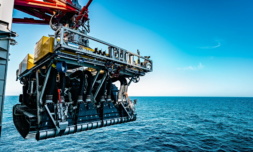The luxury second-hand site has launched a striking campaign to announce they’re banning fast fashion giants Zara, Uniqlo, and H&M.
Vestiaire Collective has been a solid advocate for the green-fashion market since its inception in 2009.
At the time, it was one of the first online retailers that specialised solely in second-hand luxury brands, and today remains one of the biggest.
Last week it announced it would be banning fast fashion giants Zara, H&M, and Uniqlo from its online stores, a significant move as all three brands dominate the high street.
The decision is aimed at combating the environmental and ethical issues associated with fast fashion, and – along with its companion campaign – has garnered both praise and criticism.
Of course, a staunch sustainability advocate like Vestiaire was unlikely to make a quiet announcement. Instead, the brand has orchestrated a campaign featuring AR imagery of clothes waste falling across various major cities.
The videos are paired with startling statistics around fashion waste, including the headline ‘92 millions of textile waste is discarded every year. That’s enough to fill… the Eiffel Tower every day.’
This marks the second year in a three-year rollout to ban all fast fashion from Vestiaire’s site. Last November, the company announced its first selection of blacklisted brands including Asos, Boohoo, Miss Selfridge, Missguided, Nasty Gal, Pretty Little Thing, Shein and more.
The addition of Zara, H&M and Uniqlo comes as fashion waste continues to rise, urging drastic action.
To decide which retailers to cut, Vestiaire worked with nine industry experts including Orsola de Castro, co-founder of Fashion Revolution, to build a new framework defining fast fashion on five criteria.
These include the repairability of items, how many items a brand launches per year, and the speed to market.
Vestiaire’s campaign comes ahead of Black Friday, one of the biggest and (increasingly) controversial sales in the fashion calendar. During this period, brands will allow prices to plummet and encourage mass spending. This ultimately leads to increased waste and land-filled junk.
View this post on Instagram




















